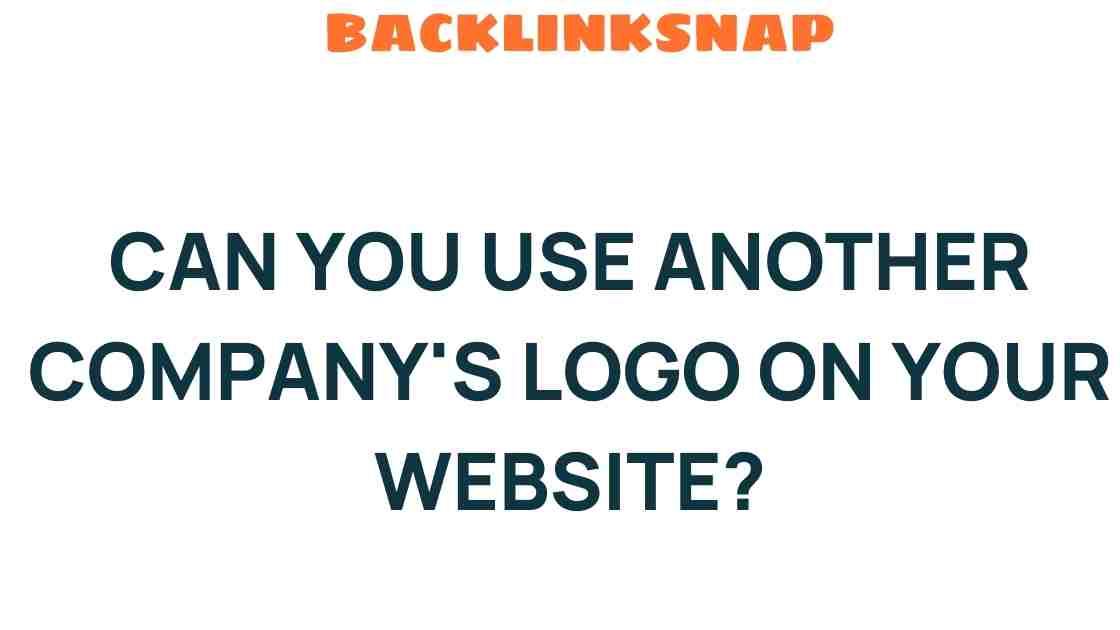The Legal Maze: Can You Use Another Company’s Logo on Your Website?
In the world of digital branding, the logos of companies hold immense value. They represent brand identity and encapsulate the essence of a business. However, when it comes to logo usage, the legal implications can be quite complex. Many website designers, marketers, and entrepreneurs often find themselves asking, “Can I use another company’s logo on my website?” Understanding the intricacies of copyright infringement and trademark laws is crucial for anyone involved in online marketing. This article aims to navigate through the legal maze surrounding logo usage, shedding light on the potential pitfalls and best practices.
Understanding Logo Usage and Intellectual Property
Logos are more than just images; they are intellectual property protected under trademark laws. A trademark serves as a badge of origin, helping consumers identify the source of goods or services. When a company creates a logo, it typically registers that logo as a trademark, granting it exclusive rights to its use. This means unauthorized logo usage can result in serious legal repercussions.
In the realm of copyright, logos can also be protected as artistic works. Copyright law protects the original expression of ideas, and a unique logo design qualifies as such. Therefore, using another company’s logo without permission can lead to allegations of copyright infringement, which can be financially devastating and damaging to your brand’s reputation.
When Is It Acceptable to Use Another Company’s Logo?
While it might seem tempting to leverage another company’s logo for your website, there are specific situations where such usage may be acceptable:
- Fair Use: This legal doctrine allows limited use of copyrighted material without acquiring permission. However, fair use is a complex concept and can vary based on the context and purpose of the use. It’s typically applicable for commentary, criticism, or educational purposes.
- Licensing Agreements: If you have a formal agreement with the company whose logo you wish to use, you can do so legally. This could be in the form of co-branding partnerships or sponsorship deals.
- Public Domain: If a logo has entered the public domain, it can be used freely. However, most logos are still protected by trademark or copyright.
Using another company’s logo without permission can lead to a number of serious consequences, including:
- Legal Action: Companies are vigilant about protecting their brand identity. Unauthorized use can lead to cease-and-desist letters, lawsuits, and significant legal fees.
- Financial Penalties: If found guilty of copyright infringement or trademark violation, you could face hefty fines, damages, and even the loss of your domain name.
- Reputation Damage: Being associated with legal issues can tarnish your brand’s reputation. Trust is hard to build and easy to lose, especially in the digital world.
Best Practices for Logo Usage in Website Design
To avoid legal pitfalls while designing your website, consider these best practices:
- Always Seek Permission: If you believe a logo would enhance your website, reach out to the company for permission. A simple request can go a long way in avoiding legal issues.
- Use Your Original Logo: Invest in creating a unique logo for your brand. This not only establishes your brand identity but also ensures you won’t face any legal challenges.
- Consult Legal Experts: If you’re uncertain about the legality of using certain logos, consult with an intellectual property attorney. They can provide guidance tailored to your specific situation.
Digital Branding and Legal Implications
In today’s competitive online landscape, digital branding plays a pivotal role in the success of businesses. A well-crafted logo can enhance brand recognition and customer loyalty. However, understanding the legal implications of logo usage is essential to maintain that success. By respecting trademark laws and intellectual property rights, businesses can build their brand identity without the looming threat of legal action.
Conclusion
Navigating the complexities of logo usage can be a daunting task. However, with a solid understanding of copyright infringement, trademark laws, and the importance of brand identity, you can make informed decisions that protect your business. Always prioritize originality and seek permission when considering using another company’s logo. By doing so, you’ll not only safeguard your business against legal repercussions but also foster a culture of respect within the digital marketing community.
FAQs
1. Can I use a logo if I give credit to the company?
No, giving credit does not protect you from copyright infringement or trademark violation. You need permission from the company to use their logo.
2. What are the consequences of using a logo without permission?
You could face legal action, financial penalties, and damage to your brand’s reputation.
3. Can I use a logo for educational purposes?
This might fall under fair use, but it’s essential to evaluate the context and purpose of your usage. Consulting a legal expert is advisable.
4. Are all logos protected by trademark laws?
Most logos are protected, especially if they are registered trademarks. Unregistered logos may still have some protection under common law.
5. How can I create a unique logo for my website?
Consider hiring a professional designer, using design software, or utilizing online logo creation tools to develop a logo that reflects your brand identity.
6. Where can I learn more about trademark laws?
You can visit the U.S. Patent and Trademark Office for comprehensive information on trademark laws.
By staying informed and compliant with logo usage regulations, you can enhance your digital branding efforts while avoiding the legal maze that comes with copyright infringement and trademark issues.
This article is in the category Digital Marketing and created by BacklinkSnap Team




